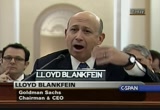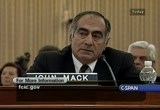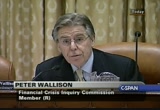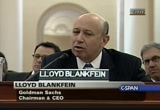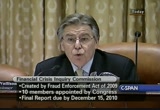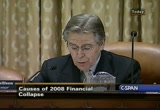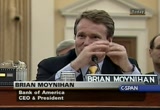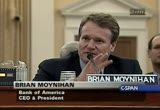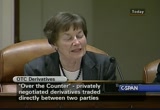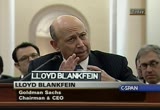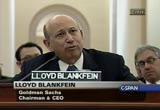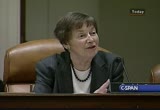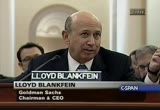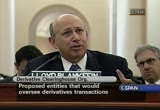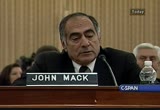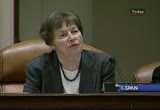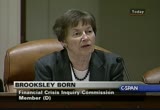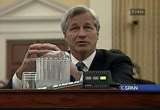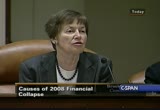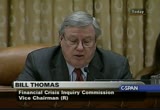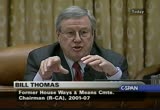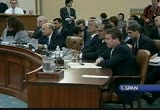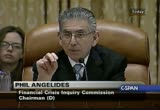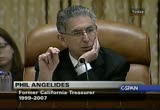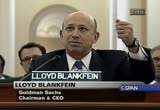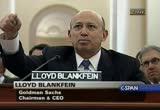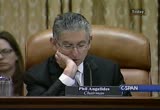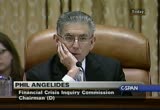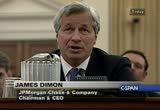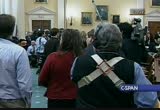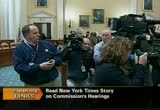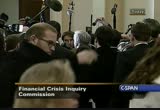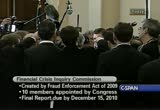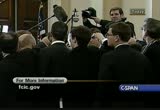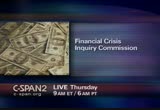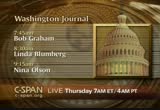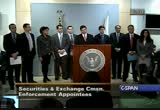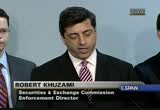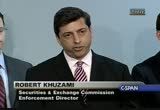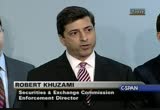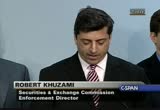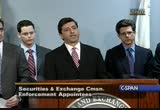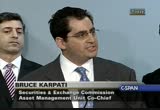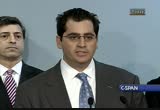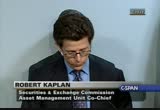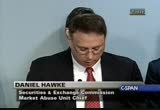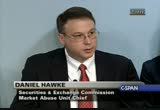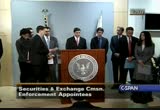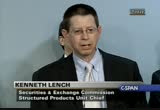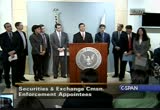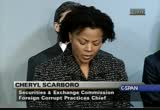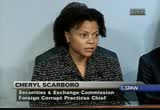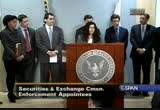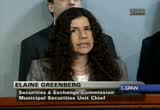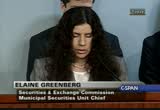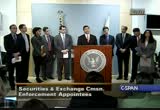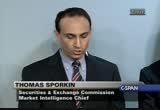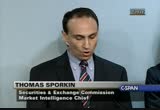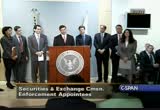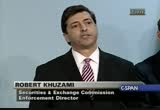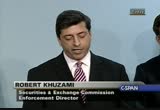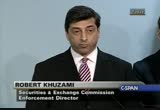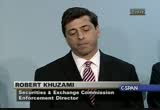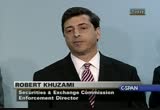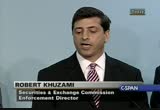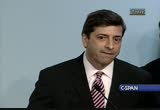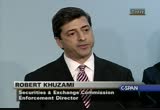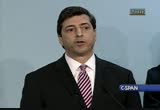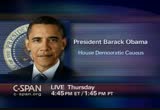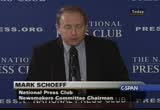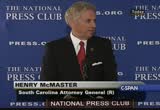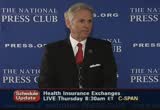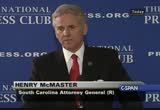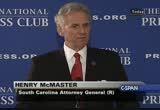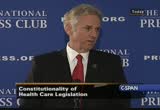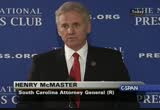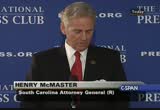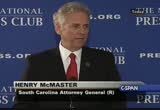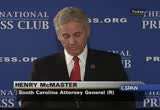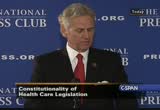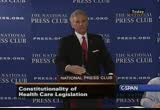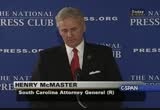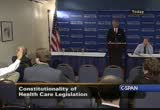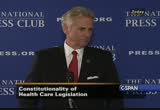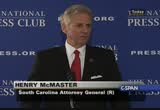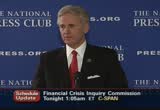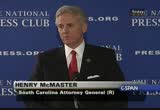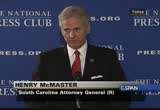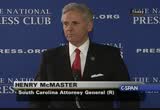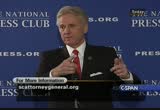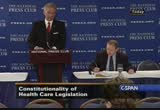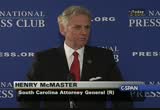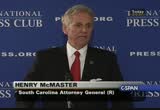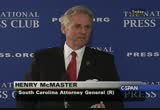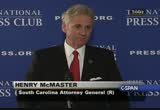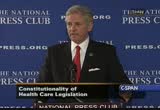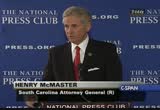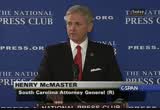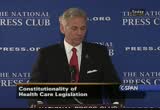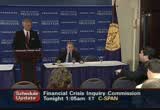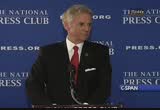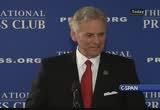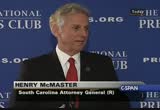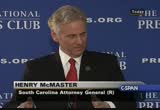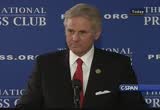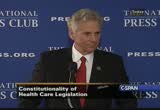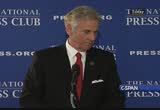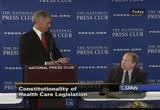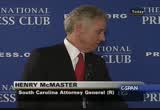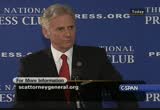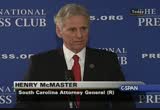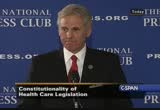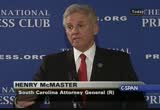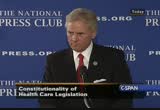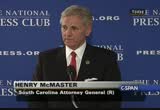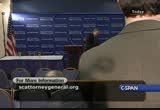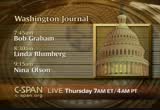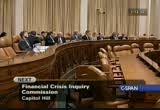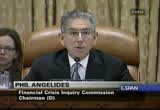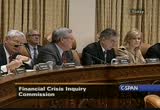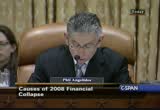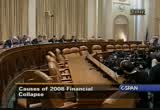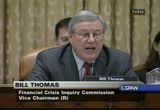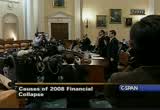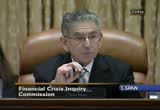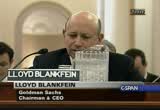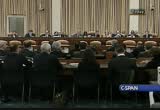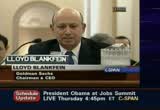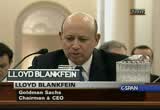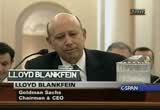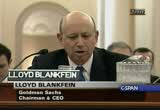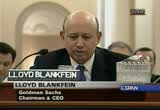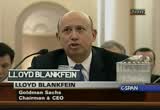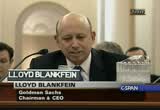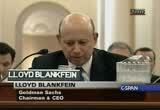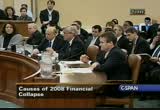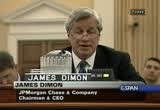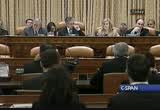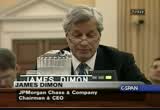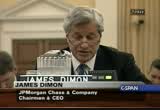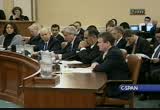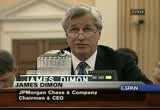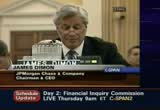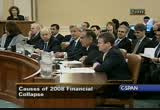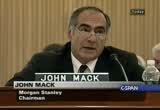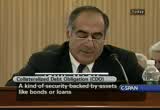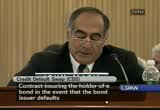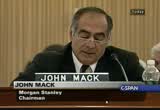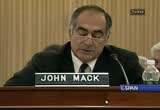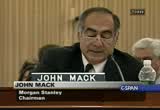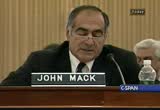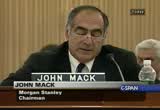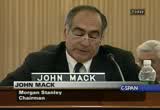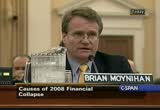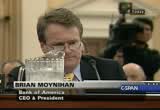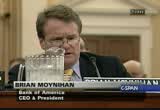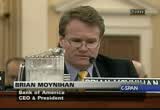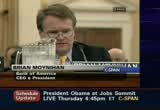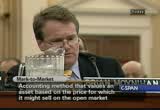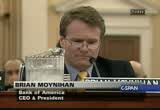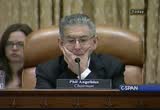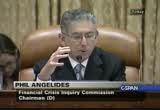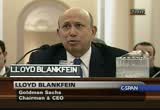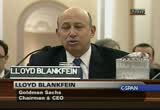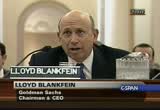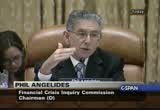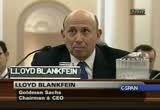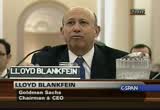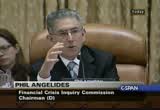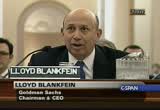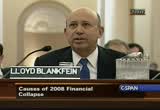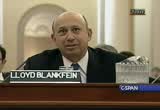tv Capital News Today CSPAN January 13, 2010 11:00pm-2:00am EST
11:00 pm
at this moment, i do not think it is as important as some other things, because it is how much capital you have to have in cash. >> i fully agree, but it has been published in the newspapers, deleveraged numbers have been published in the newspapers, -- deleveraged numbers -- leveraged numbers, and i am trying to get at this. . >> mr. mack, would you enter the
11:01 pm
same question? at least there have been reports that the investment banks became much more highly leveraged after the sec took over regulation and about 2004, and imposed basel ii regulations. can you explain why these allegations are out there? >> i think it happened but i don't think was tied to the oversight of the sec. i think you had a robust period of low interest rates. people took more and more risks, but i don't see the connection. we would be more than happy to go back and look to -- look through our files and talk to our general counsel and give you a better answer. i don't think that was the trigger point. >> back to you, mr. blankfein.
11:02 pm
when was goldman first renault -- alerted the fact that there were serious problems with subprime mortgages? >> i would have to look back. i wasn't at all focused on end until -- new don >> goldman was early to recognize the dangers according to reports, and began to use indexes to protect itself. >> know, first of all, we have research which we will make available that showed -- published research to the world that we were very negative on the housing market's going backed away before 2007 and 2006. our movement in the mortgage market was for us a matter of
11:03 pm
hedging in managing our risks, because as a syndicator of products, we were usually in the position of finding ourselves long, much like banks that had problems and accumulated, our management protocols to sell down those positions or else stop at servicing clients to one of the syndicate those pools of loans. -- who wanted to syndicate those pools of loans. we wanted to moderate our risk, and you use the term, going short. what we were trying to do was get closer to home. we roll along, and every other financial to institution would have the stuff, we were trying to get back into risk.
11:04 pm
>> you said that residential mortgages were underwritten. i think you implied that one of the reasons was that there was so much money around and losses were not being suffered. and that is probably true. but were there any other reasons that traditional mortgage standards, such as an 80% loan to value ratio and so forth, were eliminated, eroded over this to imparted -- in this time. ? >> i will be three additional minutes. >> time does go fast. >> i believe that the losses were going up. the whole industry, all of us
11:05 pm
saw those losses. economist will it get it and you see the same thing that i say, a low rates deal with and do a lot of housing speculation. i've always looked at fannie mae and freddie mac as being part of the issue and how it grew over time. i do not blame them for the bad behavior of our underwriter banks but i think they were part of those problems. >> let me ask you about my limited time available -- in my limited time available, what is in your view proprietary trading? >> the rules of the federal bank, the national bank, are such that -- but that around.
11:06 pm
we conduct our securities companies much like our colleagues. >> that is not the bank. >> is part of the holding company. you can talk about it and try to define it, but i think when you all set a position, if you're doing it for the firm, it is managing the risk. the challenges of about regulating proprietary trading in some of the bank holding companies -- what is proprietary and what is customer-driven? if we delay interest to help a metal customer, we have to offset that, because we cannot carry one side of the trade. we have to offset that. on the other side of the trade, it is proprietary. at the end of the day, is to
11:07 pm
manage risk so that we can provide that middle-market customer business. that will be the challenge. it is a very difficult task. >> i am trying to get that one question -- is there a trading business, a proprietary trading business within the bank, rather than the holding company? >> i can answer that in a written submission but ours is in the securities company. >> thank you. miss born. >> thank you. i am going to address first the issues regarding the enormous and unregulated over the corner derivatives market. your institutions are four of the largest otc derivatives
11:08 pm
dealers in the world. the office of the comptroller of the currency has reported that in september 2009 you collectively held over-the- counter derivatives positions of more than $230 trillion in notional amounts. your positions consisted of more than 33% of the world market in over-the-counter derivatives. mr. blankfein, in your written testimony you have stated that the standardized derivatives should be exchange traded and cleared through a central clearing house. you further state "this will do more to enhance price discovery and reduce systemic risk than perhaps any specific rule or regulation."
11:09 pm
i like ask your opinion that the role that over -- your opinion of the role that over-the- counter derivatives played in contributing to the financial crisis. >> i think you and i have different opinions about this. but i would say that the aspect of the over-the-counter derivatives market was a very big concern and a bit worried, so much so that all lot of institutions -- all of the institutions here, i believe, working very hard that things would settle and that things would clear and that we started the process of creating these clearing houses well in advance of this particular crisis and really glad that we did. it was highly publicized that the federal reserve bank of new york created a program to make sure part of this was done well. that was a very big concern. as it turns out, my belief is that the derivatives market
11:10 pm
functioned -- over-the-counter derivatives market functioned pretty well under the circumstances. now the risks imbedded in that they had credit in them, people made bad credit decisions. and some of those credit decisions were in derivatives and some were in terms of securities. but the derivatives market itself actually work better, i think, than we had a right to expect. and if you could call anything like the in the crisis, it was that it worked so well fannie and freddie, lehman, all had massive defaults with huge numbers of setting -- all setting, and in the benefit of hindsight, people were able to hedge their risks, protect themselves, and it worked very well, better than i would have
11:11 pm
thought. i don't think we should rely on -- i think that that was lucky. , regulators and legislators, are focused on making sure that the instrumentality and the pipes of clearing derivatives are rim place, i think it is highly justified, since we did not have a specifically derivatives crisis. >> do you think that failure or near failure of aig was related to credit swaps? credit default swaps? and you think that having clear rining would have in any way ree the inherent risks and aig's positions? >> i think it may have helped a
11:12 pm
bit. i don't think it was the key thing. aig was bent on taking a lot of credit risk. they took it out in the derivatives market and by writing insurance against credit even spirit they took it by holding securities. it was a failure of risk management, of colossal proportions. and there were derivatives in there, but it was -- those were merely mechanisms of taking credit exposure, to get paid for that exposure, and they took multiple vehicles and could have substituted other vehicles for them. >> do you think -- how would having a clearing house and having exchange trading of standardized derivatives reduce systemic risk? >> to the extent that you have
11:13 pm
-- the clearing house, to the extent that you are having the clearing house, the issue that you had within aig, or settling all over what mark to market should be for the smooth transfer of margin, we would have avoided. we got margin but it was hard to get out of them. in a clearing house context, that would be easier to do. anything that is liquid enough and can be priced easily, to go through a clearing house, should. it is standardized so it can be liquidize on an exchange, then it should. i would not bash these because they survey useful purpose. if people want to hedge their oil, let them hedge their oil. -- what should be on an exchange, should be on an
11:14 pm
exchange. and those that cannot, the bilateral contracts between company should be surveiled. >> mr. mack, you indicated that you thought that clearing would be a valuable reform efforts at this point. would you comment on that? >> i would be happy to, but as mr. blankfein said, it would alleviate some of the issues of saddling up with your counterparties. not to be redundant, but it would be very helpful. you had better discovery and shrink some of the notional amounts by being able to do that. i think it would go along way in helping us, especially in times of crisis, but away from that, it makes sense to do. a few years ago, we were able to
11:15 pm
put swaps business into the clearing house and has helped us on swaps. >> could you tell me how much -- i understand that only standardized contracts could be exchange traded and cleared easily. and the spoke -- customized contracts, because they are not fungible group, are not amenable to clearing. could you tell me what percentage of the over-the- counter derivatives that your business is involved in are standardized as opposed to customized? >> i cannot give you an exact percentage. i can give you that information. predominantly they are standardized but i do not have that number of the top of my head.
11:16 pm
>> mr. blankfein, could you tell me what percentage of doris -- your business dealings are standardized? >> i would have to look. i would guess that our business mix is would be different from each other. we read different places in the market. >> i would appreciate it if each of the witnesses could provide with information on the percentage of standardized contracts that your over-the- counter derivatives business has dealt him, say, for the last four years, please. >> could yield time on that point? >> i could a little. >> if we created the standardize versus what the ratio was of the last four years, don't you think it would change all the the next
11:17 pm
four years in terms of all whole lot more bespoke and you are standardized? -- and fewer standardized? it always works that way, doesn't it? >> a lot of the derivatives are already exchange and clearing houses. we estimate that 80% would go into the clearing house. the idf that you lead this opening for over the counter, that as a way to put a lot of stuff in there. the royal army should be that if it should -- it could be cleared, it should be cleared. in a way that everybody is comfortable. >> i would like to see what our motivations are. i like things to go through a clearing house. the biggest problem we had was counterparty risk. it would suit us to have
11:18 pm
everything, not just our standardize, but it could be standardized to go on to those clearing house arrangements. the industry has been driving this. >> is born, back on your time. >> thank you. have any of your institutions changed your operations in terms of the over to kranz -- over- the-counter derivatives dealings in light of what was learned through the financial crisis? mr. moynihan. >> i think the point about the counterparty risk, everybody in our firm did a lot of work on that, and the regulators have looked at it very carefully. that risk built up in a way that people did not anticipate. that is where we spent a lot of our time. not only the core economics, but on the credit risks and
11:19 pm
transactions. >> mr. dimon. >> other than being more vigilant, i think not a lot. but i would make one exception. we spent a lot of time looking at our exposure to other large financial companies so we would be prepared if they had company since we have a lot of contracts with other companies. >> i'll like another minute to ask one follow-up question. a question that commissioner wallace and said. i would very much appreciated if each of you could submit to the commission information on your proprietary trading over the last four years, that is, that kind of trading that you are engaged in, whether it was
11:20 pm
speculative, the degree to which it was hedging your risk, and the revenues and profits for each of the last four years. thank you. >> ok, thank you, commissioner born. mr. vice chairman. >> i wanted to thank all of you. we have a very difficult job and we rely on secondary and tertiary sources which makes it very difficult. your willingness to come in front of us an answer questions that we are asking, and i might tell you mr. chairman, based on our request, and i have some question specifically to some of you. i will not ask them now but we will get them back in writing and communicate with california, connecticut, and more coming in. this is going to be very useful
11:21 pm
to is. we want to assure you as we have that any information provided to us will be handled in the appropriate legal and protected ways, especially since it would be privy to the secrets act. it is just that without your help in follow-up questions that we will ask to get some detailed understanding, that we can provide not just the rough picture of what happened, but a more nuanced, understood, in- depth picture of what happened. because quite frankly an argument that i made a lot and quit making when i was in congress it that you do not understand what i am that -- what we're doing in the context that we're doing. our job is to provide as mild and easy it form of education as possible how complicated this world is today and what makes it go around.
11:22 pm
your help in that regard is valuable -- is invaluable. we hope to get a timely response, but as we get nearer our time to exist, it will be a big push year in getting your responses. and i want to thank the panel for their willingness to come and their openness in response thing and the answers you will be giving us over the course of the next eight months. thank you very much. >> thank you, mr. vice chairman, and members. you'll be glad to know that there is a little remaining time so i some follow-up questions. mr. blankfein, maybe you can suffer from meat had been being -- suffer from this, but let me preface by saying that if i die 51% right and 49% wrong, i will be a happy man.
11:23 pm
one of the issues we have to explore it is worse this purely a perfect storm or was this a man made perfect store in which the clouds were seen? that is why i'm talking responsibility. i will put aside my view -- i am troubled by your inability to accept the probability of certainty picture firm would not have made it through the storm without vast federal assistance. but i want to turn to the situation of mortgage. many other firms as well, making subprime loans in 2001, but you securitized mortgage packages that had significant problems. 60%-20% defaults. maybe this is like murder on the orient express, everybody did it. i appreciate there was a cheap money. there was public policy driving this mortgage business, but you are not subject to the community reinvestment act.
11:24 pm
there were the standards at the time, but i hope that we would always try to elevate standards. but you're not just a market maker, your securitize in an underwriting packages of mortgages. it was clear that while the market was going bad, information about badly made practices, if you kept moving this product on to the market. what is your responsibility when you put your name on a security to an investor to underwrite that early? did you fail in that respect in that you did not underwrite the loans that you then securitize then moved into the market? >> mr. chairman, what we did in that business was under righwrio the most sophisticated investors that sock that and spencer -- that sought that exposure.
11:25 pm
it is become part of the narrative that everyone knew what happened that every minute. we did not know at any minute what would happen next, even though there was a lot fighting and there was the report, but there were people in that market that thought that the housing market was going down and there were others that thought that these prices have gone down so much that they are going to bounce up again. i remember being teased because at my shareholders' meeting in 2007, someone asked me what ending or weakened, and i said the seventh inning of the crisis. it turned out to be the second inning. what we were doing was creating prices. do i wish that we had done it? yes. >> i am asking a more direct question. was your due diligence adequate?
11:26 pm
deduced our loan tapes? in looking at what you're moving, the actual product, and in the 1920's, everything was different. wall street banks were selling bad latin american debt. at what point did you have the responsibility -- what is the sense of responsibility? >> we have responsibility to be open and tell people what they have. good product that has the exposure that these professional investors are seeking. right now we would underwrite distressed product as long as we disclose to and help somebody move that product off of their balance sheet and give it to somebody, a sophisticated investor, knowing what the product did it, knowing it would give them that exposure. >> but you were facilitating the market in which products were
11:27 pm
being offered in the consumer market that were clearly unsustainable. >> for sure, it had that effect. by allowing that to turnover, and giving the dollars back to the originators in exchange for the loans, it allowed them to go out and originated more loans. to that extent, we played a part in making that market -- all of us as indicators, and you do with the capital markets did, which is give people access to capital. >> apropos mr. mack's compelling statement about regulation recently, you have to step in and control is, is this an argument for very tough regulation of products offered at the ground level? because of the inability of the chain of securitization and a chain of private players to control the quality? >> i think nobody looking at what happened -- and the most
11:28 pm
horrible thing about this crisis is what happened to individuals and the mortgage market, as a consequence of behavior and the recession, i would say no one would argue that there should not be more protection and safeguards and regulation of that interaction between finance and the consumer. >> all right. there is one minute left. the only final question is to you, mr. dimon. how the correct asymmetry -- i was in the private business, and if you lost, you lost. you bet big and you could also lose big. there is an asymmetry here where in the financial services industry, it seems that it's almost like you're at the blackjack table but you never get wiped out. the worst you can do is walk out
11:29 pm
with what you had. on the other hand, you can hit it big. it always tilts toward the biggest risk possible because there is no consequence for the biggest bets. >> there is a consequence. you can lose your job in your reputation. but you raise the issue -- you ashley risk adjusted. you make an evaluation to the employee to their right thing for the right thing -- for the right reason. you're always assessing. but it is one-sided that we. the more senior that people become, the more stock they own in the company -- so they are responsive to the well-being of the company. they will pay the price of the company pays the price. when the company goes belly up, people did pay a price. >> even though a study said that even in those instances, people took out hundreds of millions
11:30 pm
and current compensation. >> but they should reduce some of those numbers. >> we will debate that after the session. members of the commission, members of the public, gentlemen who came before us today, thank you very much for coming before us today. we appreciate it and we will be posing a written questions to each and every one of this. thank you. photographers, hold on a minute. folks. clear out of there, guys. hang on. >> the hearing is the recess. please leave the well. >> we appreciate your first to inform the public but we will take a 25 minute break and commencing at 12:45 p.m. we will look at the second session of this hearing. thank you all very much. [captioning performed by national captioning institute] [captions copyright national
11:32 pm
11:33 pm
block this regulation? >> i did not blame the regulators at all for what happened. the people to be blamed on the people in the management companies that failed. having said that, the regulators should see what they should have done better to avoid that. lobbyists -- people have the right to raise issues. that is what democracy is about. most lobbyists are advocates with the facts. j.p. morgan chase has always tried to do the -- tried to provide the best information. i don't think that that is inappropriate at all. >> the president is proposing a new tax on banks. what do you make of that proposal? >> i am not releasing the proposal. i think it has leaked out so i am not sure if it there. i tax policy to punish people is
11:34 pm
a bad idea. but step away from that. we talked about enhanced resolution of a party, we should get close to that. it's hard for the industry to pay for the audit companies. >> but will those taxes be passed on to ordinary americans? >> i do not know what those taxes are. but all businesses pass the cost on to their customers. >> how will he give people the win this fight? you said that size can be an important factor in determining whether or not banks survive here. a lot of people here in congress say that banks like yours should be barred from doing investment- banking. they should be smaller. >> a lot of people saying that glass-steagall coming down caused the problems.
11:35 pm
it was not a combination of glass-steagall -- and size, the investor was over it -- of roses. the size of the investment, that matters. jpmorgan does business and 150 countries. we follow fortune 500 companies around the world to help them do what they do. we cannot be that small. there is a reason for size. thing you can have a debate. >> how worried are you about a public backlash over pay? >> people are saying that you guys do not get it. >> de you understand the anger?
11:36 pm
>> this financial inquiry commission continues to more. they will start off by hearing from federal officials, including eric holder, the head the deposit -- federal deposit insurance corp. she'll bury -- sheila bair, and mary schapiro. we will bring that live for you on c-span2. coming up next, the securities and exchange commission announces new enforcement tools to try to reduce financial fraud. and after that, south carolina's attorney general discusses what
11:37 pm
he thinks health care legislation -- why he thinks health care legislation could be unconstitutional. coming up on tomorrow morning's "washington journal," we will get an update on the financial crisis inquiry commission from one of its members, bob graham. linden blumberg will talk about open exchanges. and the nina will send from the irs on the new regulation -- and didn't need them -- in nina olson from the irs on the new regulations. >> abraham lincoln is a great read for any history buff. it comes from $56, a journalist, and writers. from his early years to do like in the white house. abraham lincoln and hardcover at your favorite bookseller and allen digital audio to listen to
11:38 pm
any time. available where digital audio downloads are sold. look -- learn more at our web site. >> now enforcement officers were employed it -- were reported today at the securities and exchange commission. -- enforcement officers were appointed today at the securities and exchange commission. this briefing is about half hour. >> thank you and welcome. today we are announcing the additional steps in the sec division of enforcement continuing efforts to shake -- shape of the forssmann -- shape and enforcement division that a strong, swift, and strategic. we are announcing the individuals that we of selected to manage our nationalized -- national specialized units. we are announcing a tool bookbos
11:39 pm
well. it has the potential to be a game changer for the division of enforcements. for the first time we will have formal frameworks of incentives to secure the cooperation of persons who saw, heard, and witnessed firsthand securities fraud and wrongdoing in the could walk into a court room, raise their right hand, and tell the world what they saw and what they heard. both the new national specialized units and the cooperation program result from a rigorous self assessment the division has undertaken. this was not a shovel ready project. we started from scratch and considered all ideas, new and old, subjected them all to rigorous review and analysis. in july we announced a plan to implement a comprehensive set of proposals are rising out of that self assessment collectively these initiatives have been
11:40 pm
described as the greatest reorganization in the division in the last 30 years. they include delegating to senior staff the authority to issue subpoenas, creating half ladder management structure, and eliminating the bureaucratic process and steps among others. these proposals are intended to keep our organization and processes dynamic, taking into account the complexity of the markets and products that we patrol, our finite resources, and most importantly the consequences to investors at par batting average is not as close to .1000 as we can make it. i am joined by the deputy director of enforcements, and the individual selected to lead our specialized unit. and to join our national leadership team, all of whom are seated to your right in your lap. with respect to the national specialized units, there are
11:41 pm
five in total. each will utilize enhanced training, hiring of the and consultation with individuals with individual -- with industry experience, targeted investigated approaches, and in some cases new technologies to conduct comprehensive investigations. the units will focus on areas with complicated organizational structures, regulatory schemes, on newly emerging and complex markets, transactions and products, and on targeted areas that we believe are deserving of enhanced regulatory scrutiny. the first unit is the asset management unit. it will focus on investment companies, hedge funds, investment advisers, and others. the sec it is the fiduciary unit. it will focus on large-scale insider trading and manipulation schemes and use some new
11:42 pm
technology to aid in that effort per third is the new products unit. it will cover all structural products, including collateralized debt obligations, but passions synthetic, securitized instruments, and other structured products, as well as newly developing products on wall street and elsewhere. the fourth will focus on violations of corporate bribery and other problems with the foreign corrupt act. and then the municipalities and public pensions unit. it will focus on the markets for municipal securities and the public pension funds. before i introduce each of these new unit chiefs to you, i want to emphasize that i am exceptionally proud and impressed by the death of the talent and dedication and
11:43 pm
professionalism of the enforcement staff up and down this division. and of the senior leadership gathered in front of me today. they have been steadfast in their dedication to investor protection and i am confident that we are putting in place a structure that will complement their talents and bring the full force of their abilities to bear on behalf of investors. i would now like each of these very talented individuals to speak briefly to you. let's start with bruce karpas the and robert kaplan -- bruce karpas thti and robert kaplan. >> good afternoon. robin i are proud to be unit chiefs for the asset management unit. all the last decade, the asset management industry has grown to encompass a huge percentage of both retail and institutional
11:44 pm
investors as well. it has grown much more sophisticated and complex. that is because the options for retail investment have increased beyond the standard mutual fund , and the alternatives for sophisticated investors have vastly expanded. the events of the last two years have highlighted the need for us to closely monitor the full range of the financial services industry. from sophisticated financial institutions to individual retail investors, protection of investors is our responsibility. and we can better perform that task by better understanding and focusing on the active management -- asset management industry. we also need to keep current with an industry that is constantly evolving and changing. the asset management industry is
11:45 pm
now in a period of consolidation. with consolidation comes the risk, including the potential for increased conflict, as advisers grow in size and complexity. as we pursue violations of the law, our focus will be investment advisers, investment companies, mutual funds, hedge funds, and private equity funds. in the issues will be wide ranging. but valuation and performance, due diligence and valuation, and much more. >> my name is robert kaplan and i am so pleased to be here today as co-chief of the asset management unit. our specialization unit will permit us to better identify asset management violations by developing and maintaining a more detailed specialized knowledge of the industry. we will gain insights and understanding of the operations,
11:46 pm
motivations, and strategy of investment advisers. bruce and i have all -- concentrated on this throughout our careers. over the years we have worked on some significant cases in the industry. our unit will take a buried approach to identifying and pursuing enforcement problems. first, we will remain focused on the investigations and aggressively pursue them. the subject matter of asset management is not new to us. we a brought cases in this area before and we will continue to do so in the future. second, we will establish an infrastructure to development and obtain a specialized understanding of the asset management industry. it will include a rigorous training program, industry and outreach, recruitment of expert staff from the industry. third, we will develop and utilize proactive investigative approach is that incorporate risc analytics and technology. and finally we will collaborate
11:47 pm
with others to leverage resources. thank you. >> thank you, bruce and robbery next we will hear from daniel halt -- bruce and robbed. next we will hear from da niel hawke. >> i will lead the market abuse unit. we will talk about insider trading. we will focus on large cash market manipulations, system based, and trading violations such as front running, collusive trading, abusive short-selling, and other systemic institutional regulatory violations, internal control violations, and other market abusive practices. the core objective will be goal -- will be to go on offense.
11:48 pm
we plan to identify plants -- patterns, at the outset of investigation. we are also seeking to identify entry points and places will we will surface with witnesses and others at earlier points in investigation that we can use to exploit and uncover wrongdoing. that is why key objective will be developing and deploying automated trading analysis capabilities through more sophisticated technology which can give as a strategic advantage in the way we conduct complex trading investigations, particularly those involving a large institutions. the unit will build on what it learns from case to case and build specialized understandings from the larger market participants. it will be selected in the case is that it investigates and we will expose and deter the most egregious forms of market
11:49 pm
abuse, both highly sophisticated frauds -- to work closely with the criminal authorities. we will seek to instill apprehension in the market participants to violate the law that they are undertaking consequences. thank you. >> thank you. next we will hear from can lead to ken lynch -- next we will hear from ken lynch. >> i believe that the group has a great opportunity to contribute to the success of the sec's enforcement efforts. recent events have underscored the importance of having a perot and timely understanding of structured products and other new complex financial instruments as they are
11:50 pm
introduced to the marketplace. a cop walking the beat, we must know the neighborhood and have a visible presence. the division is not new to this arena. in the coming weeks and months, we can build on our solid foundation by further developing the expertise that already exists at the commission. there are a number of goals that i believe that the group should pursue. first, i believe that banks that concentrate their resources, we will be in a position to bring some high impact enforcement actions. secondly, i was like to strategically initiate risk- based investigations in this area. the proper use of these types of internet -- investigations banks of possible to find wrongdoing that otherwise would never have seen the light of day. and dramatically alter behavior. finally, i see the group functioning as a many-think- tank. it is an additional resource
11:51 pm
that investigators across the country and others in the agency can tap into. the products are complex and the markets are opaque. individuals are savvy and their lawyers are smart. since the unit's work also encompasses new products, we will always have to be on the cutting edge. to police this be, we need to be every bit as intelligent and motivated as the professionals we regulate. >> thank you. next we will hear from cheryl scarboro, the new leader of the foreign corrupt practices unit. >> this was enacted due to the groundbreaking legislation and investigative work that the sec began in the 1970's. the commission canyon views to be at the vanguard in its enforcement of this loft -- the commission continues to be at the vanguard in its enforcement
11:52 pm
of this law. bribery and international business transaction inhibits economic development, divert scarce resources, and distorts competition. it also destroys incentives to compete on quality and price. although many companies have made significant inroads in their compliance, there is clearly more work to be done. we brought more cases in recent years, like the siemens case and against halliburton. this is an opportune time for the commission to dedicate more resources to this vital part of the enforcement program. i am honored to have been chosen to lead the unit and and i am excited about building up what we've done on this area. the primary aim of this unit is to be more proactive in our enforcement. we will gain in debt knowledge is so we can uncover corrupt
11:53 pm
practices that might otherwise go undetected group will conduct for targeted sweeps and sector-wide investigation. alone and with a regulatory counterparts here and abroad. in addition, since our cases to send to have similar -- tend to have similar features, they can serve as precedents. there was set international standards for non-u.s. regulators and service and incentives to more closely regulate these practices. this unit will raise the commission's product -- profile by playing a more active role in international regulatory working groups, building closer relations with our regulatory counterparts in other countries, and aggressive enforcement is essential in a world of increasing interdependence. companies and executives should not be outmaneuvered by those who would gain advantage with bribery and deceit.
11:54 pm
the unit will leverage the efforts of the sec, the department justice, and our foreign counterparts to leave -- a level the playing field worldwide. we will send a message that wrongdoers will face a strong and united front around the world. >> thank you, cheryl. next we will hear from elaine, the chief of the municipals securities and public pensions. >> good afternoon. my name is a lame and i will be the chief of the miscible securities and public pensions unit. hard deputy chief and i have worked together in this area for many years. we believe that specialization is important to facilitate the commission's ability to more effectively police the municipal securities market. as you may know, municipal securities is huge and continues to grow. currently, about $2.80 trillion
11:55 pm
of men miscible bonds are outstanding, and more than $400 billion of new bonds were issued just last year. it is a reflection of the importance of the marketplace to or nation's future, that is because the vast majority of our significant environmental, educational, and health care facilities are financed with municipal bonds. with approximately 50,000 state and local issuers, is a highly diverse market. with regard to public pension funds, this area is also quite large, in the u.s. totaling about $2 trillion. yet despite the size and complexity of this market, it is thinly regulated 3 miscible securities are exempt from the registration requirements of the federal security laws. -- it is thinly regulated.
11:56 pm
municipal securities are exempt from registrationñi requirements of the federal security laws. our unit will focus on developing strong cases that send a resounding message about particular conduct, cases that will have an impact on the behavior of market participants. through the unit we plan to build a comprehensive enforcement programs where we will develop the case law and legal precedents to the high impact cases that we bring. we also will proactively seek to identify market activities that pose the greatest risk of harm to investors and are indicative of potential violations. the unit will focus its efforts on investigating and pursuing enforcement action in five categories of misconduct. one, offering disclosure fraud.
11:57 pm
taxer arbitrage fraud. 3, paid a play and public corruption violation. four, public pension accounting and disclosure violations. and five, valuation and placing fraud. thank you. >> we are also announcing today a different sort of specialized unit, one that is critical to the division's initiatives. our chief of market intelligence, responsible for the collection, analysis, triage, risk-weighting, dissemination and monitoring of the tips and referrals that the division receives each years. and more important, to harness that information that allows us to identify trends and connections and then uses that it permission to better inform our invested give focus and priorities. tom, please come to the podium.
11:58 pm
>> thank you, rob. good afternoon. i've been chosen the chief of new marketing intelligence. we will spearhead a new approach, proactive intelligence gathering, information collection, and both human and automated analytics. we have much information that comes in with the complex data provided by the self-regulatory organizations. the idea is to create an integrated approach that will help us identify market practices and activities that pose risks to investors. our primary goals will be to first triage and develop tips and leads and get that information to the right people within the division in real time. using the experience of the professionals to proactively identify market practices and activities that pose risk to investors and assess how best to
11:59 pm
address those practices and activities. the office of market intelligence will work with the other divisions and offices on the new tips, complaints, hot line that will be implemented in the next weeks a month. that system is designed to get information quickly into the hands of staff that needed to ensure that nothing false the crash. it will provide law enforcement employees to access to data archives that can be searched for information relevant to their ongoing investigations and mind for fraud trans. -- and mine for fraud trends. plans to operate a state of the art data collection, analysis room. including the real time trading
12:00 am
basis that will result on a project we have been working on since the past summer. this is an exciting time to lead this new group. thank you. >> thank you, tom. each of these units, as well as the entire enforcement division, will benefit greatly from the other initiative that we are announcing today, cooperations. cooperating witnesses can be the most valuable witness in fighting against fraud. we believe it will be equally valuable in our securities and enforcement efforts. why? because the benefits of a water -- cooperated testimony our benefit -- are many. cases can be made quickly and efficiently. call operators are most often insiders who had been -- cooperators are most often
12:01 am
insiders to have seen this. their testimony is irrefutable. more wrongdoers can be brought to justice to the increased efficiency of cases and investigations that include coal operator testimony. and finally, cooperating witness can be the master key that unlocks the intricacies involving complex transitions that unwise -- that otherwise go undetected. .
12:02 am
>> here, too, it would only be if they did it truthfully in connection with an investigation and to comply. with these new tools, a real reality for wrongdoers. that reality is that when you engage in misconduct, you now have to think even harder about the possibility of others coming forward to report to the s e c
12:03 am
your secret conversations, your hushed plants, and your schemes and deceptions, and for those thinking about cooperating, they should consider seriously about coming to the s.c.c. correctly -- quickly -- coming to the sec quickly. latecomers really will qualify for cooperation credit, so there is every reason for them to step forward before someone else does while they are in a position to benefit from their knowledge of what occurred. thank you, and i would be happy >> can you talk about, maybe a labyrinth, on what is new with the unit? -- maybe a elaborate? -- maybe elaborate? are you diluting their focus at
12:04 am
all? >> with respect to the unit, each of the units, not just the municipal securities, but each of the units will have additional resources that they will be able to utilize to see the units and start them off, and that includes technological support, administrative support, and the hiring of individuals with industry knowledge or market expertise, so there will be an expanded availability of resources to allow these units to do their job. with respect to dilution, i do not think that is a concern. i think these are areas that complement each other, and, obviously, to the extent to which we find a need in one area or any of these areas that the extent of wrongdoing or misconduct is significant, we will add resources as necessary. >> are the units up and running now? >> the units are really up -- there has been a lot of planning that has gone on.
12:05 am
today's formal announcement of the chief is the start of the operation of the units, but, again, as you heard from many if not all of the speakers, we have been active in each of these areas already, but the formal unit structure starts today,ok d it will be filled out with additional staff in the coming weeks. >> what happens to all of those working groups that you had before? >> well, some of the working groups are coming to their natural conclusion, in many respects. i am talking about things like options backdating, auction rate securities, although there are things to be done there -- auction rate securities. other things will continue, -- option rate securities. involving countrywide, american home mortgage, others, and it has really done a great job, so that will continue, and others, they may simply be subsumed by
12:06 am
the unit. the reason we are particularly excited about these units, we will have a real focus training and expertise with an eye towards the future. being a head of the curve and tried to figure out where the misconduct is starting to occur, where the warning clouds are starting to gather so the we can operate more quickly before more investor money is lost. >> can you talk about what is different with the formal written agreements? is it more formalized? what has changed now? >> we have used informal cooperation methods in the past, but i think that the critical difference here is that we will now have a policy statement that
12:07 am
will be issued, as well as the availability in these formal agreements, which will communicate to individuals out there in the world, defense councils, and other constituencies, that this is now a formal part of our process they can take advantage of, and to some degree, it will be more open and discussed, so i think, therefore, it will be utilized by many more. >> a streamlined process at the justice department, immunity. is there any more? >> the authority for seeking community has been delegated to the enforcement director, but all of the same steps that have to be taken, other than making more efficient the steps within the commission, but the request from the justice department that immunity be followed will go along the same steps that it always has. >> about the credit? >> well, that is really going to
12:08 am
be determined. it cannot help but be determined on a case-by-case basis. we will thoroughly probed an individual situation to determine whether or not they are a proper candidate for cooperation based on the timeliness of their information, the value of their information, and their agreement to various terms and conditions -- we will thoroughly probe an individual. the commission will determine. >> the sec agreement? >> i doubt we would have a joint agreements, but we may have parallel lines.
12:09 am
i think these tools will be particularly important, not just in these areas, but the vast majority of the cases, which we do them alone and it will be important in certain sec-only cases. one more question? >> no more questions? all right, thank you very much for your time. [captions copyright national cable satellite corp. 2010] [captioning performed by national captioning institute] >> you are watching public affairs programming on c-span. up next, south carolina's
12:10 am
attorney general talked about why he thinks health-care legislation may be unconstitutional. after that, bank executives discuss actions leading up to the global financial failure in 2008. they took lessons from a member of a bipartisan commission created by congress. president obama will be at the capitol tomorrow afternoon to attend a jobs summit with house democrats. live coverage begins at 4:45 eastern, and later, on c-span2, we bring you a debate between the republican candidates for governor in texas, including the incumbent governor rick perry, facing senator kay bailey and debra dedina. a group of state attorneys general say they may file a lawsuit -- debra medina.
12:11 am
henry mcmaster is part of the effort. he talks about the constitutionality of the health- care bill at the national press club. this is about one hour. >> thank you all for joining us at the national press club today. i am the washington correspondent for work force management, a business publication, and i am chair of the national press club news makers committee. however, i am coming near the end of my tenure, and in three days, the new chair will be here, who is also with us today. oh, here he is. he is also with us today. he is a member of the club, of course, and he will be the newsmakers' chair for 2010. he is a reporter. i also want to thank some others, a press club member who
12:12 am
has helped us put together things. today, we are going to address the health-care bill, so that is centered in the negotiations right now between the house and the senate. we are pleased to welcome to the national press club henry mcmaster, one of 13 state attorneys general to send a letter to harry reid and nancy pelosi, protesting a provision of the health-care bill that obligates the federal government to pick up the entire cost of medicaid expansion in nebraska. critics call it the cornhuskers to kick back, designed to secure the votes of senator ben nelson for the health-care bill. mr. mcmaster will explain why he
12:13 am
and the other state attorneys general believe it is not lawful. today, he weighs into another controversial and potentially dangerous area, health-care reform, so, welcome, henry mcmaster. >> those prosecutions are not controversial. almost everyone is in agreement with locking up the internet traffickers and drug smugglers. this has achieved some conversation run the country, and i will be glad to answer any questions anybody has about it. it is actually a very straightforward thing, and that is that we have now, there are 15 attorneys general, including 13 republicans, who have joined together on this issue, concerning the so-called cornhuskers kick back, and the
12:14 am
other challengers and critics and criticisms of the bill itself, both in the house and in the senate, those are not a part of this letter and this effort by this group, although some are all in this group, and some are otherwise not participating in so far, and they may join together or may do something individually about other matters concerning this bill, if it becomes law, so that is where we stand today, and now, i will tell you how it all began, and then i will be glad to answer any questions you have as long as you have them. when the bill was passed in the senate, there was great fanfare and a conversation about senator -- excuse me, senator ben nelson's participation, and as you know, his was the 60th vote for cloture, the critical 60 its vote for the bill to move forward, and at the time, there
12:15 am
was no controversy at all -- excuse me. there was no misunderstanding at all about his motivation. no one suggested that the so- called cornhusk your kick back was put in the bill for any reason other than to achieve his vote. now, under the constitution, there are many reasons for putting things into bills. to achieve somebody's vote on a bill like this, that is national in scope, is not recognized by the constitution, the case lot in the constitution, as we see it, so as the bill passed under those circumstances, there are a number of us who had questions about it, and on dec. -- excuse me, december 21, or thereabouts, just before that, i received a telephone call from senator lindsey graham, we said that the
12:16 am
letter was on the way from senator lindsey graham and senator jim demint, asking me as attorney general of south carolina to look into this question of the constitutionality of this particular provision, and i began doing that, and i also began seeking input from my fellow attorneys general from around the country, and the first two to offer support in an effort were greg abbott's of texas -- abbott of texas and another, and the result was the draft of a letter which was then re-drafted and edited, and the product of that is the one dated december 30, which we addressed to speaker pelosi and senator harry reid, outlining our reasons why we believed that that particular provision is unconstitutional.
12:17 am
in a nutshell, what it boils down to is this. the constitution is very bold in giving spending power to the congress, but the spending power of the congress is not unlimited. there must be limits on it, and the limit is the spending cannot be arbitrary or capricious, is what the case law says, and a bill like this, which would affect every state, that would involve taxes and benefits for every state, maybe not at exactly the same level, but would involve every state, it begs the question as to why nebraska is being treated differently. if there is a reason for treating nebraska differently, where 49 states are burying their share of the medicaid expansion and indirectly bearing nebraska's share of the expansion, then there has to be a reason for it.
12:18 am
the only reason that has been posited by anyone is that was what was necessary to get senator ben nelson's votes. that is not a reason that is recognized by the constitution as legitimate. if there was something else, that would be different. they are not on treated the same because there are distinctions, and a lot of times, there is a lot of horsetrading that goes on, as we all know, but there is always a reason given. well, there is no reason given here, except for the one that i have recited, and that is unconstitutional and is likely seen by many as a symbol of the excesses of the culture of
12:19 am
corruption and excess of spending and fiscal irresponsibility in the congress. now, that is not addressed in this letter. what this letter addresses is simply the constitutionality of that one provision. now, after we wrote that letter, the next day, which was thursday, december 31, i received a telephone call from senator gramm, saying he had received a telephone call from senator nelson -- i received a telephone call from senator lindsey graham, saying he had received a telephone call from senator nelson, asking me to call the dogs off. he assured me there would not be constitutional problems, and i said what would satisfy this group, which has now grown to 15, is to take that provision out of the bill and do not let it become law. he explained that either that
12:20 am
what happened or that the same provision would be provided for every state, and, of course, if the same provision is provided for every state, then that does not propose a constitutional problem that the attorneys general would be concerned in and protecting their states. what would raise other questions would be fiscal responsibility and budgetary questions and all of those kinds of questions that are rampant right now in the current budget crisis in the economic crisis, so that is where we left it, and one was very interested. he said, i know, just like ronald reagan, trust but verify, and he was assuring me that something would be done, and that is how i left it. december 31. after that, i asked drew edmund son, an attorney general who had
12:21 am
been there several times, if he would join on with me to go to the national association of attorneys general, and as we often do, send out a letter, asking other people to participate if they like, and that was sent out about one week ago. we had people, both republicans and democrats, who were quite interested. others decide on. others were interested in signing on, but they wanted to change one sentence, or they had editorial comments on the letter, and we ran out of time, so now, we have 15, but there are others who are interested in the question. there are other sort interested in other questions, as well, probably the most prominent of which is the individual mandate, which is, i believe, and i presume others believe, although not a subject of this particular letter, we believe -- of course,
12:22 am
this is a 10th amendment question. congress has power to spend, and congress has power to tax, and the mandate is neither of those. congress has the power to regulate interstate commerce, but this is something that is not in interstate commerce. this man is requiring people to buy something that they do not already have, and that is going off of the scale in the question of constitutional law, and i believe, and i know some other a.g.'s believe, some of whom are on this letter, and some of whom are not, depending on what comes out of the congress and what is signed by president obama. the next question is, if they do not take those provisions out, the unconstitutional parts there, and i want to state clearly that we are not challenging the other aspects,
12:23 am
the policy aspects, of the bill. that is not the focus of this group of attorneys general. it is just the constitutional question involved, but there are a number of other questions that need to be answered, and it may be myself included in who might be interested in pursuing remedies there, but the question is, what court do you go into? for a state, generally speaking, and there are, perhaps, some exceptions, and these are the sorts of things that will need to be finalized through research. a state can sue a state only in the original jurisdiction of the u.s. supreme court. thesg have only been 139ñr cases to be accepted by the united states supreme court in their initial jurisdiction since we became a country. mine was on a case where south carolina was suing north carolina over the water.
12:24 am
they were stealing our water, drinking too much of it, and the court accepted that as the 138th case in its original jurisdiction, which is a very big deal. that is not a case that has a trial. that is in an original jurisdiction. now, however, if an individual sues the federal government, or if an individual sues an officer of the government, that is someone who would be involved in providing these benefits or implementing the program, that could be done in and a u.s. district court, and probably the same for the state of south carolina or any other state suing someone, some officer, some federal officer, in their official capacity, not their individual capacity, who would be involved in implementing this program. it could be done in any district court in the united states. again, i emphasized by
12:25 am
individual or by ice -- bought a stake. it is not unusual for attorneys general to join together on issues. this is the first time we have had one like this since i have been and attorney general. i have been here for just over seven years, but it is not unusual for us to join together three amicus briefs, to sign on toçó letters like the one from a bit ago, opinions and concerns on proposed legislation, regulations, to even support or oppose or to bring lawsuits in connection with each other and, as i mentioned, to file an amicus briefs, so there are plenty of opportunities, a lot of different ways that a case concerning this and other provisions could be brought to the courts, but all of us, i know the 15 who are participating in this effort at this time, we would prefer to have these provisions taken out of the bill and not put into law, and that would solve these
12:26 am
problems with us. so, i think i have covered it all. i would be glad to try to answer any questions anybody has. yes, sir? >> please identify yourself and your organization when you ask your questions. >> roger, with gannett. wltx in columbia. 15 states? >> yes. >> i know about 13. where are the other two? >> the other two are oklahoma, and american samoa, and i do not remember their attorney general's name. she is appointed, and she is a democrat. but if i may, to follow-up, -- qu>> if i may, to follow-up, let
12:27 am
me ask you a question. do you support the health-care bill as it is written? >> no. and, in fact -- neither. but that is not a part of this effort by these 15 attorneys general. that is a separate question. yes, sir? >> attorney-general, could i ask you for a few more details about your conversation with senator nelson? there are some few things that i would be interested in. how long did it last? >> about 10 minutes, i think. >> ok, was an amicable? >> yes, very, very cordial. >> and did you discuss the central issue with him? for instance, you said -- you have indicated -- you hinted a little while ago that the motivation for adding this provision is made shifting on
12:28 am
the side of the democrats. did you directly ask him whether this provision was added to get your vote? did you directly ask him that vote? >> i did not ask him that question because he asked it first. he said he did not ask for it to be put in. that is correct. he said, as i recall, that that was a marker put in by the leadership, and what he had hoped for was that every state would have the option to have what nebraska got. >> does seek this it is fair or unfair? what did he say to you about it? what does he think a better challenges? >> -- about your challenges? >> well, he did not give any indication about whether he thought the challenge would be successful or not. he explained that he did not ask for the provision and that he
12:29 am
was going to fix it, that he would hope, and he had intended, for every state to have the same benefit that nebraska got, but the only provision that was put in was the one for nebraska. >> thank you. >> you are welcome. >> i am sorry. james rosen. >> i recognize him. ok? >> you were talking about some of the other potential provisions, demanded, for example. >> yes. >> could you flashback out a little bit more? >> yes. -- could you flusheseh that out?
12:30 am
how does the united states have the authority to require someone to buy health insurance or anything else? and there is no provision for that in the constitution or in the constitutional law, as i know, and others agree, because the congress has the power to tax, and it has the power to spend. as you know, the constitution provides certain things that the federal government can do, and the 10th amendment says the state's do everything else. this is something that would fall in the latter category, if it follows there, but it certainly does not fall into the category of the federal government. the federal government can tax and can spend and can regular army, navy, air force, and marines, and other things, interstate commerce -- it can regulate interstate commerce, but this is not a matter of
12:31 am
interstate commerce. if this involved traffic flow or something like that, where the activity was being conducted with state commerce, then that would be a question. this is an instance where the federal government is requiring an individual to buy insurance that they may not want and may not need and may not be able to afford, and that is taking the federal government into a completely new area. senator orrin hatch and two gentlemen wrote a piece for "the wall street journal" that goes into that and three potential constitutional infirmities, and that is one of them, and i agree with them, and mr., i cannot remember his name, one man was at a meeting i attended earlier, and he is very well informed on it, and, anyway, there is a lot of law that agrees with what they had in there.
12:32 am
>> a compromise bill that comes out, if it does not contain this provision, you would be ok with that? >> which provision? >> the nebraska, the cornhuskers provision? >> yes, that would end the effort that is signified by this letter, but that is -- i am not saying that would and all efforts that might be signified by additional letters or not even by electors at all but by lawsuits, either by states or by individuals. >> what would you tell people who tell peoplemcmaster is -- this is a political issue. he is trying to score political points. he is running for governor. you said that senator lindsey graham is the one who initiated the call to year, both him and senator demint send a letter, both of them republicans. they voted against this bill. they hate this bill, so they are trying in every possible to stop it.
12:33 am
what is your response? >> if i was complicit in theirs or they are complicit in mind, i do not know. [laughter] -- they are complicit in mine. there were a number of a.g.'s and other scholars and news people around the country who were raising questions about the constitutionality of various parts of this from the very beginning, but when i received that letter, we went into additional discussions and conversations and began the telephone calls to the other attorneys general to see if they saw it in the same way i saw it, and the three of us in the beginning, and then we called some others, and we ended up with a group of 13 at that time, and then we went into the discussion of what should we do, and should we write a letter, and if so, what should it say, and the letter went through a
12:34 am
good bit of work, and i think if you read it, you will see that it is not a provocative letter. it is a legal document. it is of the legal issue, it iomething --gal issue, this bill is something that would put a burden, a financial burden, on my state, from nebraska, at a time when we can barely keep the lights on in my state, and here comes another unfunded mandate, underfunded in every way but nebraska, and we are all cut funding nebraska'-- we are all funding nebraska's progress, and that is why we question that. why would this critical after this instead of focus on others? i think it is because this was the most harrolerald adn egregi, and i will not speak for the others, but i will speak to my
12:35 am
-- for myself about a culture of corruption and access that has taken up in washington. it is a very serious threat and problem, and sometimes the state need to -- states need to reign washington in, and that is what we are trying to do. yes, sir? >> can you talk a little bit more about the legal side? is it illegal or unconstitutional -- if it is unconstitutional, what specifically in the constitution tells congress how it can go about getting an agreement on legislation? >> well, there is nothing that says how to go about getting agreement on legislation in the constitution, but the constitution, as concerns of this agreement, and this is just one way to approach it. privileges and due process, the welfare clause, a variety of different ways, all of which
12:36 am
will have to be considered very carefully as pertains to who can bring a case in and it is necessary to do so and if we should, but it is the case law that provides the details, what allows congress to spend money for the general welfare, so the question comes up, well, what is general welfare? is that anything? or are there some limit on it? the cases have defined it to say that there is a limit on it. the power is given to congress are bold, but it is not unlimited. this spending is provided for if it is a reason, and that is further defined as not being arbitrary or capricious. for example, a bill that provides for health care for services or spending around the country and says send $10 million to this gentleman just because we like him, that is likely to be found unconstitutional, because it is
12:37 am
unrelated to the rest, and it shows an arbitrary and capricious approach. that is the precise thing that we see here. the only reason it has been suggested by senator nelson or anyone else, that is, there is no contradiction that the way nebraska got the special deal was because the way harry reid and the senate democrats needed his vote for the passage of the bill. that is an arbitrary and capricious reasons. it treats nebraska differently, and it treats the others unfairly, and that is recognized in the constitution. it depends on your lot. arnold schwarzenegger says if it were done in sacramento, it would be -- it depends on your law. ñiin south carolina, it would probably not be.
12:38 am
i say "probably," because the law is unclear, but it could be if it took place in south carolina. it is undecided, whether it would be or is not. our law is fairly specific. a person who is bribes, received something of value, -- a person who is bridbed. if this had taken place in south carolina, and these allegations were made that the only reason for doing it was to get something for nebraska, is this getting something for himself? for example, there have been instances in which people in south carolina have suggested that if you will vote for this particular piece of legislation, we will send money to your campaign account. is that a bribe? in some cases, probably so, probably not. we do not know. it says, "if you will vote for
12:39 am
this piece of legislation, we will give you $1,000," we know that is a bribe, and people have gone to jail, and the attorneys got precisely that. $1,000. that is why we have laws that are very strict on that sort of thing there, so in south carolina, would this be a state crime? it is difficult to say yes or no, but it would be highly regarded as completely wrong. whether it is illegal, whether it is criminal, it would be regarded as wrong. i have not researched the law in california to see what reference governor schwarzenegger was making. >> i was just wondering, you talked about one and then two and 13, and now you are 15, and now it is bipartisan also.
12:40 am
are you heading towards allstate's together? by all, not just 13 or 15, all a.g.'s? -- are you heading towards all states together? >> whether an attorney general bringing it or otherwise, if someone filed such a lawsuit, i expect there would be a lot of amicus briefs and a lot of support around the country, but i do not know how many people will join us. there may be more. i do not know that. >> have you contacted others? everybody? and the second is how far are
12:41 am
you going to go with it? you are running for the governor. if you become a governor, would you still be interested in this particular subject? >> i will be very much interested in the subject if i am governor, because, again, it is an unfunded mandate for the state of south carolina, and we are barely keeping the lights on the look at we have had to slash our budget. our constitution does not allow deficit spending. if the income is not coming in from taxes and fees and money from the federal government, we have to cut the budget, and that means we have to cut the budget of every agency, and when the legislature is not in session, it is made by a board that just makes across-the-board cuts, and i think we had cuts just over 40%, so, yes, i am concerned about it now. if elected as governor, from that position, i will still be
12:42 am
concerned about it. >> the president has announced a body of 10 governors, five from each party. not more than five from each party. what is your take on that? to solve the emergency problems? >> i am not aware of what he did. 10 governors to solve the problem of this health-care bill? it is always good to have help, from whatever source, but i am not familiar with what you are referring to. there was another question from another reporter. i do not think i answered your whole question. we have 15 now. there may be others that join up, but if we were to file something, that would be as an
12:43 am
open invitation, as it always is, to anyone who wants to express their views, either pro or con, to file an amicus brief. oh, about was the question. attorneys general of oklahoma, and i, through the national association of attorneys general, sent out a letter about one week ago, inviting others to participate, and the attorney general from american samoa signed on to the letter as written. there were other republicans and democrats to interested but who wanted to edit the letter further, some major, minor, but we were running out of time to keep tinkering with the letter, and we settled on the one that we had, as time ran out, that was the end of that letter, but anyone can file an amicus brief, and we often do on cases.
12:44 am
>> mr. attorney general, a, have you gotten any response from senator harry reid or nancy pelosi, and did you make any efforts to meet with them while you are here, and if not, why not? >> i wrote a letter. i wrote this letter. it as the signature of 13 attorneys general on it, and we have not received -- at least, i have not received a response. i know of no response of the others have received, and i do not expect to receive one at this point. this letter was dated december 30. >> so why did you not make any effort to meet with them while you are appear to try to resolve this issue? >> i do not believe my meeting with them it can produce fruit. if they had responded to the letter and asked for a meeting,
12:45 am
i would of been most happy to meet with them and anyone else, but it is their turn. >> mr. attorney general, thank you for being here. i am a member of the press club and not a reporter. i own it public relations firm in washington, d.c. in your comments, you said earlier that senator nelson told you he did not ask that provision be inserted to the bill, and yet, just a few moments ago, you said with great fanfare, he took great credit for it. i just want to know which statement you believe to be correct. >> both. he told me, as i recall, and i am fairly confident this is precisely what he said is that he said he did not ask for that to be in there. he preferred a similar provision for all states, but he only got it for nebraska. but he did not ask for nebraska
12:46 am
to be singled out, so he was responsible for nebraska getting it, but he did not ask that were brought -- that nebraska only get it. do you want me to say it again? >> earlier, you say that he did not ask for it, and now, you are saying he did not ask for nebraska only to get it. after governor schwarzenegger made the comments, a report is issued showing that governor schwarzenegger himself engaged in this very exacts a activity at the state level that he was complaining about at the federal level. i just want to know if you are aware of that and if he would file a similar suit in california against the governor if you saw it happening there. >> a pesky questions. no, our focus is on the state of south carolina, and this bill, as written, imposes a burden, a
12:47 am
fiscal burden, on the people of south carolina for the benefit of another state, and it is nebraska only that was accepted. the other states bear a burden for their own people and then the board and for nebraska, as well. that is what we think it's unconstitutional. your other question, i want to be sure we have this straight, and it's you seem to be interested in it. he said he did not ask for this provision. what he wanted was a similar one for everyone across the board or an opt in or opt out for all of the state, but the only one that was included in the bill, the only state that was included, was nebraska, that is what he said. >> i only brought of governor schwarzenegger because you did, and, again, thank you for indulging me with questions. i have one other question that will be of a pesky nature, as well.
12:48 am
you mentioned the "the wall street journal" op-ed piece from senator orrin hatch, and in october, "the wall street journal" editorial page had some very negative things to say about your behavior and questions or ethics having to deal with no bid contracts or friends and then turning around donating $60,000 in contributions to your campaign. i am wondering, can we call that a carolina kick back? >> you are right. that is a pesky questions. [laughter] >> and thank you again for indulging me. >> sure. my state, i, bring lawsuits for the state against businesses very rarely. we are importuned by attorneys,
12:49 am
but we bring one very rarely, and one against eli lilly was one that had to be fought. hiring outside counsel. as was pointed out in my letter to the editor in response to the, i would say, uninformed or not completely informed editorial by "the journal" and in my state, we have eight criminal attorneys. the case of this magnitude is just too big, but the agreement that i use has been selected as the model for tort reform groups for hiring outside counsel in all the states. many of the other states have adopted the one that we use. it is a good agreement. there is nothing wrong with it, and in this case, it produced a very important results for the state of south carolina. >> i do not think the wall
12:50 am
street journal problem was the system you had with that process of hiring the attorneys but the kickbacks after they were hired. >> there were no campaign kickbacks. wait a minute. wait a minute. whoa. i know you do, i know you do. the attorneys who gave money to my campaigns and the attorneys representing the defendant, eli lilly, gave an equal amount of money to my campaigns. a judge ruled on that question and ruled that there is no ethical violation at all, and eli lilly brought it up in the case before we had the $45 million settlement. >> are the other attorney general since signed on to your legislation -- you keep reference in the letter. is there a new letter today, or is it the same letter from the 30 and that you're talking about? >> is there a new letter today
12:51 am
-- from the 30th that you're talking about? >> the 15 attorney general's -- attorneys general, are they aware of that? are they aware of that kind of behavior? >> you have to ask them. >> have you come in addition to writing this letter, are you also crafting a lawsuit? or can you shed some light on that process? are you going in, formally drafting it? where does that stand? >> well, at this point, the attorneys general are doing -- i do not know if all of them, but i know some of them are doing additional research to determine and to make determinations about whether a case should be brought -- excuse me, about
12:52 am
which course record a case should be brought in, it is necessary to bring the case. and there are other observers who are interested, as well. >> just to go back to your conversation with senator nelson, i want to make sure that i have something straight. did he say, or was it your understanding that he said that when others get the benefit, if all get the same benefit, the conclusion seems to be that the federal government would pay for it, the entire increase costs, which would increase the deficit and not make this revenue neutral, which is what president obama was talking about. is that what he was saying? he wanted other states to get the same benefit that nebraska is no getting it? which is the federal government is going to cover their added cost? is that you are saying he said
12:53 am
proved that the federal government covers all of it? >> that is the way that he explained it to me in a telephone call, but his precise words were that he did not ask for the special treatment. what he preferred was an opt out, caught in a position for other states or similar treatment for other states. >> ok, and it would sure clear understanding of that is basically saying he would have liked the federal government to cover the entire cost? >> i cannot say that that is exactly what he wanted. i do not know whether it was opt in, opt out. i do not know. >> to the product of the chair, i have a question, as well. number one, do you have any hope that this provision will be taken out? >> yes. >> you said you did not meet
12:54 am
with senator reid or speaker pelosi. they are the ones who are going to be making the final decision on this, so, number one, do you have any hope that it will be taken out, and if so, what is that based on, and secondly, if this provision stays in the bill and is signed by president obama, what do the attorneys general due later that day or the next day if the president signs the bill with the in there? >> if the president signed the bill, and the nebraska provision is still there, the question is, what will we do? at that point, we will confer again to determine if, when, and where and how and under what constitutional approach a loss it would be filed. i attempted to touch on that a little bit earlier with a different type of lawsuit that a state can bring and where they must be brought. >> in getting it removed, if you
12:55 am
come to washington, and you do not meet with the gw people making the decision on the bill or do not have any hope of meeting with them -- >> i am not saying that -- there has been much conversation that i have followed in the press on it and that changes that may be made, and, of course, my conversation with senator nelson indicated that there may be changes made, that he was in favor of changes, so we really do not know. i do not know what to expect. vdot >> i cannot remember the technical name for them, but these are small bills better off the past played at night or early morning when no one is around, often by a voice vote, but they basically give special tax breaks to individuals, to individual companies.
12:56 am
they are always brought on behalf of one senator or one congressman, usually on behalf of a constituent. are you aware of this legislation? it has been written about. it has been a long time. there is a technical name for this kind of legislation, but do you know anything about this? have you ever heard of this? >> yes, there is a name for it. i do not remember what it is. >> are those laws, and it has been awhile since i have written about this, but i think there are hundreds of them every year. are each of those laws unconstitutional because one individual is getting a tax benefit that is paid for by every other american taxpayer? >> you mean bills involving money? >> my belief is that these bills provide tax benefits, and
12:57 am
various sorts of tax relief, and this is when an individual actually goes to a member of congress, makes these requests, and these bills are routinely pass. are all of these bills unconstitutional under the same theory that you an offering in this case? >> i do not believe so, because, of course, they are not part of the national legislative effort or the national legislative purpose, and i would presume, although i have not studied any particular ones. we're concentrating on this one. i assumed said they assume some reason for it other than to get someone's boats in one of the legislative bodies. >> why is providing one individual tax benefits, why is that a more legitimate purpose than getting one senator? >> that is a good question.
12:58 am
that is outside, and i would be glad to have someone do some research and try to provide some guidance on that, but the thing that we have studied at some length is this provision, this cornhusker kick back, and the resources or our conclusions are set out in the letter. i can tell you about that one. >> i understand that this particular one is egregious, and that is what prompted the legal examination on your part, but the individual mandate has been around, with the democratic leaders talking about this, and it has been a part of the house bill. how could that rise up to the legal challenge? that is around for quite some time. that has been egregious, too.
12:59 am
>> that does raise constitutional questions, but this one with senator nelson coming in, the fanfare of the 60 th vote and all of the attention on it, many, and i presume others, as well, to conclude that it would be harmful to our states and that we need to do something, and as i say, there may be others. they may attack some other part of the bill if it becomes law. none of this has ever been mob before, which explains the absence of the challenge, but if this does become law, i would expect there to be numerous challenges, some that we know nothing about at this time. they could come from anywhere. >> on behalf of south carolina, contacting you, and they are going to watch it on c-span,
1:00 am
1:01 am
bearing their share of nebraska is something that should be challenged. i had not calculated the amount but there had been various calculations. our budget in south carolina is so tight that we cannot handle and more mandates. -- any more mandates. are you talking about a whole bill are just the cornhuskers -- per person? oh, i have not calculated that. but it has been estimated that the benefit to nebraska would be
1:02 am
in the hundreds of millions, and it would go well for years indefinitely. and that adds up to a whole lot of money. yes, sir. >> with senator necks and -- nelson, did you agree to stay in contact? is there some more communication between you? >> we made no agreement to discuss it later. but certainly it would be possible. i would love to hear from them as to what promises are being made behind those closed doors. i would like to know. and if there is a conversation and he stated his position and i stated month on behalf of the state. -- mine on behalf of the state.
1:03 am
>> we are nearing the one-hour mark that we allocate for newsmakers. if there are no further questions, i want to thank the attorney general for joining us today at the press club. i want a bank each of you for taking time out of your day to come over and visit with us. we are now adjourned. [captioning performed by national captioning institute] [captions copyright national cable satellite corp. 2010] >> you are watching public affairs programming on c-span. up next, bank executives discuss events leading up to the global financial failure in 2008. they took questions from members of a bipartisan commission
1:04 am
created by congress. in other financial news, the securities and exchange commission announced a new enforcement tools to try to reduce financial fraud. that briefing is later. coming up on tomorrow morning's "washington journal," we will get an update on the financial inquiry commission with one of its members. after that, the urban institute will talk about exchanges. and then a representative from the irs on its agencies new regulation. "washington journal" begins every morning at 7:00 a.m. eastern. >> did you know that the new free news app is c-span radio? you can get quick access to free streaming audio channels. there is also a tab with links
1:05 am
to all of our podcasts, including q&a" and afterwards. it is available from the app store. >> now the first meeting of the commission appointed by congress to examine the events of last year's near collapse of the financial services industry. witnesses include top executives from goldman sachs, j.p. morgan chase, morgan stanley, and bank of america. the commission made up of six democrats and four republicans is required to report to congress by december 53 this year phil angelides chairs the commission and former house ways and means committee bill thompson is the vice chair. >> the meetings of the financial crisis inquiry committee will
1:06 am
come to order. there is a quorum present and so we will now proceed with this first of our public hearings. good morning to everyone and thank you for being here. i am honored to welcome you as we start this series of public hearings into the causes of the financial and economic crisis that has gripped this entire country. i thank vice chairman thomas for his extraordinary cooperation and partnership. i applaud the dedication of my fellow commissioners and i am grateful to all of our witness for giving us their testimony and sharing their wisdom. we have been given a critical mission, one that goes far beyond any party or even policy agenda. to conduct a full and fair inquiry into what brought america's financial system to its knees. we are after the truth, all hard facts, because it is our job to
1:07 am
provide an unbiased accounting of the actions they get -- that led to a devastating economic consequences for so many american families. we will follow the evidence wherever it leads. we will use our subpoena power as needed. and if we find wrongdoing, we will refer it to the proper authorities. that is what the american people want, that is what they deserve, and that is what this commission is going to give them some already speak of the financial crisis in the past tense as an historical event for the truth is that it is still here and still very real. 26 of maryland -- 26 million americans are unemployed or cannot find full-time work or had even given up looking for jobs. over 2 million families have lost their families to foreclosure in the last three years. millions more have a very legitimate fear that they will. retirement accounts and life
1:08 am
savings have been swept away and vanished. people are angry. they have our right to be. the fact is that wall street is enjoying record bonuses also many families are struggling to stay afloat. it has only heightened the sense of confusion. i see this commission is a proxy for the american people. their eyes, their ease, and possibly also their voice. this form may be the only opportunity to have their questions asked and answered. this form may be our last best chance to take stock of red really happened so that we can learn from it and restore faith in our economic system. if we ignore history, we are doomed to bail it out again. and so we expect our witnesses before to be forthright. we need candor about the fact -- the past so that we can face the future. this hearing is the beginning,
1:09 am
not the ending, of our questioning. we will take testimony from hundreds of individuals. witnesses called to testify today are likely to come before us again as this unfolds. those night and asked to be before us -- let me close with this thought. my father grew up in the great depression. like so many of his generation, he was shaped by sacrifice, hardened by economic hardship and ward, keenly affair -- aware of the recklessness that made the life of his in so many other so much harder than it needed to be. his generation learned the lessons of financial disaster so that the country could avoid it for decades. let us learn the lessons of our time. let us be diligent and awful to date so that our financial and economic system can fully rebounded and enriched and sustain americans for the years
1:10 am
to come. mr. thomas. >> thank you very much, mr. chairman. i would ask unanimous consent that my witness statement be made a part of the record and i want to thank all of the commissioners. we have been doing a lot of bad 7/8 of the iceberg under water. you all not easily see that. i think all of us are conscious of the fact that these hearings, notwithstanding the drama of the hearings, is not the fundamental work that is before us. it is as you have indicated asking the question the american people would like answered and doing it in the way in which we increase the understanding, but comprehension of what happened. obviously for the purpose of not having it happen again. i think the chairman. >> thank you, mr. vice chairman. and now we will go to the
1:11 am
witnesses on our first panel. let me say that it will be the common and customary practice of this commission in public harassing -- hearing to swear witnesses. this is not unusual. i would like ask each of the witnesses to be sworn. and out like that aspect use was banned that i swear you win, the common practice. -- and i would like for each of you to stand so that i swear you win, but common practice. duke, liz wear or a firm under the penalty of perjury that the testimony you're about to provide the commission will be the truth, a whole truth, and nothing but the trip to the best of your knowledge? thank you so very much. gentleman, thank you so much for being here today. we appreciate you coming here and sharing your views with us. i should tell everyone here that each of the witnesses today has submitted written testimony which will be available on our web site, which is fcic.gov.
1:12 am
also available in the room today. we have asked each of the panelists to make opening statements of no more than 10 minutes. and so i think we would like to proceed with that. i will signal you when there is one minute to go so that you can wrap up. and so let's do this. with that, i think we would start with mr. blankfein. we will go when all about corporate mr. blankfein, please proceed. -- we will go in alphabetical order. >> thank you for the opportunity to contribute to the commission's work to understand the causes of the financial crisis. goldman sachs was established 141 years ago. we are an institution focused firm providing investment banking, market making, an investment management services
1:13 am
to corporations, institutions, governments, and high net worth individuals. as an underwriter, we help our clients access equity and debt capital markets in order to grow their businesses. as an adviser, we facilitate strategic mergers and acquisitions. we provide necessary liquidity as market makers to make sure that buyers and sellers can and click their transactions and security march and -- security markets can function efficiently. we help public and private pension funds, non-profit organizations, and high net worth individuals plan, manage, and invest their financial assets for the long term. to begin on a more general point, any examination of the financial crisis should set out with an understanding of some of the global economic and financial dynamics of the last two decades. the growth in the amount of foreign capital, 10 years of low
1:14 am
long-term interest rates, and other factors coalesced over many years to create a sustained period of cheap credit and excess liquidity. this in turn generated a desire to find new investment opportunities with higher returns. many of the best were thought to be in residential housing. one contributing factor to the track -- the attractiveness of the housing market was the active support of the expansion of homeownership, recognizing the societal benefits. for our industry, it is important to reflect on some of the lessons learned and mistakes made over the course of the crisis. at the top of my list are the rationalizations that we made to justify the downward pricing of risk was different. while it recognized that credit standards were loosening, we rationalized their reasoning -- the reasonings such as the emerging markets were growing
1:15 am
more rapidly come up or risk mitigation were better, there was more than enough less -- liquidity in the system. a lack of credit -- of skepticism was equally true with credit ratings. to many financial institutions relied on a rating agency to do central work of risk analysis. another failure of risk management concerned the fact that risk models, particularly those predicated on historical data, were too often allowed to substitute for judgment. next, size matters. whether you owned $5 billion or $50 billion of supposedly no risk sumer senior debt -- that in a cdo, all likelihood of loss rates would appear to be the same. but the consequences of a miscalculation were obviously much bigger if you had $50 billion of exposure. you get a $50 billion exposure. risk monitoring it failed to capture the risk inherent in
1:16 am
off-balance sheet activities such as siv's. financial institutions did not appreciate the full magnitude of the risks they were exposed to. their counterparties were unaware of the full extent of those vehicles and could not accurately assess the risk of doing business. fourth, assets at certain institutions were not valued at their fair market value. one consequence was that losses were not seen it early enough so weeks -- risks were not curtailed. çt(a second consequence was tht bank balance sheets became suspect. as a result, lending between counterparties froze. fifth, financial institutions simply did not have enough capital to meet the extraordinary market and are meant that arose after a long period of benign conditions.
1:17 am
lastly, the role we play in the capital markets is to support economic growth. some of the activities we undertook contributed to the prevailing mood of the time. we did not know it then or even today when it actually crossed over into a bubble territory. but we lend money out too cheaply and in certain loans without the traditional safeguards. we did not recognize early enough that risk was being misprized. we made too many liquid investments, particularly in real a state. and we were 20 concentrated in a leveraged loans. -- too concentrated in leveraged loans. we did not see as clearly as i would have hoped the excesses' so we did not raise a hand and asked whether some of those trends and practices that became commonplace really served the financial institution's interests. i hope one of the improvements made would be the creation of a mechanism by which the industry can step back, try to assess if markets have gone too far, and
1:18 am
consider what needs to be done. in light of these lessons, it is important to consider principles for our industry and for policymakers as we move towards reform. risk and control functions need to be completely independent from the business units. clarity as to who risk and control managers' report is crucial to maintaining independence. to increase overall transparency and help ensure that book value really means book value, regulators should require all assets across a large financial institution with a capital markets business be accounted for on a fair value basis. also, all of the exposures of financial institutions should be reflected through its pnl. valuation and capital standards across risky assets, regardless of the legal entity in which they are held, must be consistent. one of the largest dress is placed on goldman sachs and
1:19 am
other firms during the height of the crisis was a possibility we were managing risks in the same way that other institutions which were hampered or later failed, had managed to their wrist -- risks. without question, direct government support was critical in stabilizing the financial system. we benefited from it. the system clearly needs to be structured so that in future, private capital, rather than government capital, is used to stabilize troubled firms problems before crisis takes hold. the two mechanisms that hold the most promise for addressing this and addressing too big to fail our ongoing stress tests, which are made public, and contingent capital, possibly triggered by failing a stress test. these elements could be the core of a strong but flexible resolution authority. certainly, enhanced capital
1:20 am
requirements in general reduces democrats. but we should not overlook liquidity. -- in general it will reduce the stress. if the funding is relying on short-term buying, low leverage will not be much comfort. regulators should lay out standards that recommend prudence and the need for a longer term maturity depending on the assets. institutions should be required to carry cash at all times, insuring against extreme events. i want to briefly discuss our firm's experience in 2008-2009. while we certainly had to deal with our share of challenges during the financial crisis, goldman sachs was profitable in 2008. as i look back to the beginning and throughout the course of the crisis, we could not have anticipated the extent. we did know at any moment that an asset price would deteriorate further or had declined too much and would snap back. having to fair value are assets
1:21 am
on a dailyw3 basis and see the results of that marking in our pnl, forced us to cut risk. throughout 2007, we were committed to reducing certain of our risk exposures, even though we sold at prices in the market -- many in the market thought were irrational or temporary. after the fact, it was easy to be convinced the signs were compelling. in hindsight, the events were not only unpredictable but sometimes looked like they were more obvious. the truth is that no one knows what is. happened. and that recognition defined our approach to risk management. we believe key attributes of our strategy and process these were validated during the extraordinary events. but they have also prompted a change within our firm. over the last 18ç months, our balance sheet has been reduced by 1/4, while our capital has increased by over half.
1:22 am
our capital ratio has increased to 14.5%. our poll of liquidity was relatively higher at the onset of the crisis, but we carry a great deal more cash on our balance sheet than ever before to deal with contingencies. while we believe our firm has produced a strong relationship between compensation and performance, we have announced additional reforms in this area. and our shareholders meeting last year, we outlined specific compensation principles. consistent with those principles, in december, we announced that the firm's entire management committee will receive 100% of their shares at risk which cannot be sold for five years. we announced that the five-year holding period of shares of risk includes an enhanced recapture provision that will permit the firm -- [unintelligible]
1:23 am
finally, our shareholders will have an advisory vote on the firm's compensation principles and the compensations of its named executive officers at the firm's annual meeting of çshareholders in 2010. we appreciate the opportunity to assist the commission in their critical role. i look forward to your questions. thank you. >> thank you so much. >> if you touched a button on your microphone and you move the microphone at fairly close to it because they are very distance sensitive. >> i am chairman and chief executive officer of j.p. morgan chase and company. i appreciate the invitation to appear before you today. if we get to learn from this crisis, we must be honest about the causes and develop a realistic understanding of them that is not overly simplistic. ççyour contribution to this de
1:24 am
is critical. i hope my participation will for the commission's goals. i want to start by touching on some of the factors i believe that led to the financial crisis. much has been said and much more be written on the topic. my comments are a summary in nature. as we know all too well, new and moç products helpedç fuel excessive speculation and fire -- far higher credit losses. çexcessive leverage by many u.. investment banks, foreign banks, commercial banks and consumers pervaded the system. this included hedge funds, private equity firms, banks and nonbanks. there are alsoçç several structural risks in the lead up to the crisis. there was an over reliance on short-term financing. over time, certain financial
1:25 am
terms became too lax. another factor in the crisis was our regulatory system. i want to be clear. i do not blame the regulators. they have a critical role to play. but the responsibility for a company's actions weren't -- rests on the company's management. we can see what could have been done better in the regulatory system. it is organized with overlapping responsibilities. [inaudible] xdçthey need toç address the e of large, global financial companies. much of the mortgage business was not regulated. capital standards allow too much leverage in investment banks. the extraordinary growth and high leverage of the gsc's also added to the risk. a number of are cyclical biases proved harmful in times of stress. our reserves were at their lowest levels when the time when
1:26 am
high provisioning might be needed the most. certain capital standards were pro-cyclical. and credit agencies required many financial institutions to raise more capital. i believe it will be found that macroeconomic factors will have an underlying at some of the -- the fundamental underlying cause of the crisis. because large distortions and interest rates and consumption. as for j.p. morgan chase, the last one. five years has been one of the most challenging periods in our company's history. throughout the financial crisis, we never posted a quarterly loss. we served as a safe haven for depositors. we worked closely with the federal government. would remain an active l ender. if we were not doing these things right going into the crisis, it would've been too late to start once the crisis began. j.p. morgan chase did not undo the leverage for capital or rely
1:27 am
on low-quality capital. we have used conservative accounting. we have built up strongest loan- loss reserves and remained high liquidity. -- maintained high liquidity. we did not build up our structural financial business. we deliberately avoided large, risky positions on structured cod's. do's. we did not rely heavily on wholesale funding. we stayed away from siv's. before 2005, we recognized that credit losses were low. we did not write payment option arms. we did make mistakes. first, we should have been more diligent when negotiating and
1:28 am
restructuring letters for letters indicating loan transactions. in response, we have tightened their oversight of loan commitments we made. the underwriting standards of our mortgage business should have been higher. we enhance our standards, essentially returning to traditional 80% alone it devalued ratios. all of the business originated by mortgage brokers. çeven so, we remained at relatively strong throughout the crisis. so much so, about when -- that when called upon to take actions to help stabilize this -- the system. the federal government help us to assist in preventing bear stearns from going bankrupt on monday morning. on september 25,t( required the deposits, assets and liabilities of washington mutual from the fdic. we learned we were the only bank
1:29 am
çprepared toú@zt immediately. in addition, we continued to lend and support our clients financially -- financing throughout the crisis. we provided more than $800 billion in direct lending and billion in direct lending and corporat we're the only institution that agreed to lend california money and its timing. even though, we have been able to maintain lending to small businesses by $4.5 billion. for the millions of americans dealing with this crisis, we are doing everything we can to meet our obligations. we moved approximately 600,000 new trial loan modifications to homeowners through our own program as well as through participation in government programs. our capabilities, size, and diversity of business had been essential for withstanding the
1:30 am
crisis. it was strange to put in a -- to be put in a position to acquire bear stearns and washington mutual. some say that the merger caused some of the crisis. we disagree bridge some of the most consequential failures were mortgage companies and thrift companies. our economy needs financial institutions of all sizes and business models to promote economic stability, job creation, and customer service. we operate around the world and employ millions of people. these firms need banking companies to provide financing in billions of dollars. let me be clear. as i said before, no institution including our own should be too big to fail. we need a regulatory system to provide the largest systems away to fail that does not put taxpayers at risk. a way that will not affect
1:31 am
taxpayers. shareholders and unsecured creditors should bear the full cost of failure. it lies in our ability to face problems and learn from experience is and make necessary changes. i want to thank the commission for their contribution to this process. we stand ready to assist the commission in any way weekend. thank you for the opportunity to testify before you today. >> thank you very much. >> i am ready to go. distinguish commissioners, my name is john mack. i am the chairman of morgan stanley. i also served as morgan stanley's to eat -- ceo from jean, 2005-2009. the past two years a ban on like anything i've seen in my 40 years of financial services -- the past two years havew3 been n like anything i've seen in my 40 years of financial services.
1:32 am
we saw credit markets seas, the competitive landscapeç remodel. the consequences has spread far beyond wall street. millions of americans are struggling to find work. they have lost homes. they've watched their retirements revet -- evaporates and their savings. the financial crisis exposed fundamental flaws in our system. there is no doubt that we as an industry made a mistake. in retrospect, it is clear that many firms were too highly leveraged. they took on too much risk. they did not have sufficient resources to manage those risks and effectively. falthe financial crisis made clr that regulators did not have the tools or authority to protect the stability of the financial system as a whole. let me briefly what you through what happenedç for morgan i]çstanley's view. in our response to the crisis. çthe entire financial services
1:33 am
industry was hit by a series of shocks that began with a steep decline in u.s. real a state prices in 2007. morgan stanley experience is significant losses related to the decline in value of securities and collateralized debt obligations backed by residential mortgage loans. this was a powerful wake-up call for this firm. we moved quickly and aggressively to adapt our business into a rapidly changing environment. we caught leverage. we strength and risk-management. we raise private capital and dramatically reduce our balance sheet. we increased total average liquidity by 46%. we entered the fall of 2008 with $170 billion in cash on our balance sheet. we were in a better position than some of our peers to wasn't -- whether the worst financial storm. we did not do everything right. when lehman brothers collapsed in its september, 2008, it sparked a crisis of confidence
1:34 am
like many of our peers, we experienced a classic run of the bank. as the entire investment banking business model came under siege. morgan stanley experienced huge swings in spreads on the threat of false swaps tied to our debt and sharp drops to our share price. this led banks to request that firms post additional collateral. in an effort to stem the panic, morgan stanley moved up its announcement of its strong third quarter earnings to september 16. but our stock remained of her heavy pressure. it lost nearly 1/4 of its value the following day, falling from 28.7 to 21.75. despite the strong results, it continued to trade lower and finally traded as low as $6.71. this crisis of confidence in the market fed a chain reaction to the broader economy, as lower prices for financial assets
1:35 am
undermined confidence and lead to lower prices. this year was marked by rampant rumors and speculation. my management team worked around the clock to address these rumors and it -- provide investors and employees entered information. we also worked closely with our regulators to keep them informed and achieved the right result for the markets and the economy. our position began to stabilize after mitsubishi agreed to invest $9 billion in our firm is part of a broader strategic alliance. morgan stanley also converted to a bank holding company, providing direct oversight and access to the federal reserve. the u.s. government announced its tarp investment a short while later, which also helped stabilize the broader market. the sec instituted a temporary ban on short and financial stocks. morgan stanley appreciates the many steps the government took to prevent the collapse of the financial system and the support
1:36 am
provided by american taxpayers. i believe every firm in the industry benefited from the support. morgan stanley has since repaid are tarp funds, providing taxpayers a 20% annualized return on an investment. we learned an important lesson from 2008 crisis and have adapted our business to help prevent something like this from happening again. one of the clearest lessons with the many firms -- many firms simply carry too much leverage. morgan stanley moved aggressively to reduce leverage, cutting it in half from --q from 33 times at the end of 20 -- 2007 to 16 times by the third quarter of 2009. we raised a total of $14 billion in capital. we have also taken a number of steps to diversify our revenue and funding sources, including it through an expansion of our
1:37 am
wealth management business and extending maturities on our debt. we have made important changes, systemic changes to our business practices, including scaling back proprietary trading. morgan stanley also devoted significant resources to further strengthen our risk management policies and procedures. including naming a new risk officer early in 2008 and adding about 100 more people to the risk management process. we have enacted changes to how we pay our employees and ensure that compensation is linked more closely to performance and does not encourage excessive risk- taking. we were the first major u.s. bank to enact a call back for portion of your and compensation in 2008, one that exceeded tarp requirements. we have since strengthened this provision further so we can call that compensation for up to threeç years-- claw back
1:38 am
compensation for up to three years. we have also developed a performance plan. we are increasing the portion of your-and compensation that is deferred to all employees. -- year-end compensation that is deferred to all employees. are recommended to the board that i received no bonus in 2009. qthis was a third year in a row that i recommended no bonus to my board. morgan stanley is also doing its part to get our economy moving again. we are working with businesses to raise capital to invest in job growth. we are working to -- with families to modify mortgages so families can stay in their homes. the end of november, 2009, are long services subsidiary. modifications in place for 44% of borrowers who are over 60 days delinquent and eligible for
1:39 am
the administration's call affordable modification program. this is the highest percentage of any service the participates in the program. we believe this is a business imperative and public important. the financial crisis laid bare the failures of risk-management in individual firms across the industry. it also made clear that regulators do not have the tools or the authority to protect the stability of the financial system. that is why i believe we need a systemic risk regulator with the ability to ensure that excessive risk-taking never again did jeopardize the entire financial system. we cannot take risks of the system. that is what drives the engine of our capitalist economy. but no firm should be considered too big to fail. the complexity of the financial markets, financial products exploded in recent years, but it is clear that regulation and oversight have not kept pace.
1:40 am
while many of these products were designed to spread out risk, they often had the opposite effect, obscure and where and to what degree that risk was concentrated. regulators and investors need to have a clearer picture of the risk posed by increasingly complex products as well as their true value. we shouldç also aim at to make more financial products fungible to ensure they should be transferred from one exchange or electronic trading system to another. i believe we need to establish a federally regulated clearing house for derivatives. this will create truly efficient, effective and competitive markets it in futures and derivatives which would benefit investors and the industry. today's financial markets are global and interconnected. our regulator -- regulatory regime it needs to be as well the u.s. has to work with countries across the globe to
1:41 am
coordinate and synchronize our risk. at morgan stanley, we are grateful for everything the federal government and the american taxpayer did to support ourç industry and to bring stability back into the market. our industry has much to do to regain the trust and confidence of taxpayers,w3 investors and public officials. thank you. >> thank you. >>w3 thank you. i welcome the opportunity to help provide some information on important matters you are investigating. çççi assumedç my role asçk of america on january 1. çin leading our consumer business, i had a firsthand knowledge and a recognition of the hardships that many hard- working families and small businesses experience. together, the financial-services companies are like the leaders andç regulators -- they must continue to on this -- to work to understand what occurred so that does nt)happen again.
1:42 am
çover the crisis, we caused a t of damage. it has affected main street. this commissions work is important because the lessons will not be simple. it had a multitude of causes that are not easily summarized. it is important that we understand the breadth of the causes of the we can understand the lessons and apply the proper policy to remedy them for the future. we have seen four crises unfold -- the mortgage prices, capital markets, a globalç credit cris, and a superior quote recession. the mortgage crisis originated with a dramatic expansion in the availability of mortgage credit. this led to a greater debt burden for consumers. lenders, prompted by lower interest rates, rapidly rising home prices and large amounts of capital available, made credit available to borrowers who could not previously qualified. or extended more credit to a
1:43 am
borrower who could or perhaps -- would not be able to handle. the national policy to expand i]american home ownership was ao popular in created tailwinds. no one involved in housing system,w3 lenders, rating agencies, investors, consumers, and policy-makers for saw the dramaticç depreciation of home prices. çwhen we did experienceç thise first experienced since the great depression, many of these loans became very unfavorable and the option of refinancing disappeared leading to defaults. the second crisis came in capital markets. investment banks have not only underwritten mortgages, but they held interest in providing backup liquidity for market- related to equities print -- [unintelligible] ççit happened to money market
1:44 am
funds to purchase commercial paper from those vehicles. the stress of the financial crisis began to spread to other fixed-income products. this to stabilize the financial institutions and -- that have little to do with the u.s. or mortgage market. the contagion was global. without government intervention to restore liquidity and capital markets, the risk of global economic collapse was very real. the final crisis and perhaps the most daunting is that we have a severe economic recession going on. some would say the eek financial crisis caused the recession appeared the experts will analyze that for the coming years to establish the exact cause of the relation. one thing is clear. u.s. economic growth in the first decade of the century was funded in part by home price appreciation and the ability of homeowners to access the equity in their homes to use for spending. home mortgage and equity financing helped drive activities which continued -- contributed to the economic
1:45 am
expansion. the history of past economic cycles shows that economic expansion bui%,# rr" capital is important. what leverage requirements for bank holdings may have been better, banks will undoubtably hold more accountable going forward. capital going forward. liquidity is key. the quiddity allows an institution to meet margin calls, fund redemptions or pay deposits without having to sell liquid assets which could lead to further losses. current accounting rules need to be reviewed.
1:46 am
rules ought -- require banks to reduce reserves in good times. -- reduce reserves against loan losses in good times and build them in bad times. market accounting can become disjointed when there is no real market for any products. let me say a few words about compensation. at bank of america, our compensation guidelines are set our board of directors. the compensation program is to attract and retain the talent we need to make the business is profitable. in 2008, our company earned more than $4 billion, but that was short of what we believe we should've done for our shareholders many of the top leaders -- many of the top leaders in the company received a bonus for 2008. for the executives at the next level down, the bonuses were caught at 80%. we anticipate compensation levels will be higher than they were in 2008, but not back to pre-crisis levels.
1:47 am
our activities comply but the work we've done to the various regimes, the tarp regime and the paymaster and others. we understand the anger felt by many citizens because institutions that received federal investments in 15 months ago are now recovering and are paying their employees, especially investment banking. as a response, i would make a few points. we are grateful for the taxpayer assistance were received. we have payback $45 billion, along with $3 billion in dividends and other payments to taxpayers. çthe vast majority of our employees played no role in the economic crisis. they worked hard during this crisis to help their customers and clients and extended more than 3/4 of a trillion dollars in the fourth quarter leading up to 2009. xdweç believe are treated thoud
1:48 am
employees are a valuable part of our future. we are grateful for the courage shown by government leaders to preserve the financial system. we support regulatory reform efforts designed to prevent any recurrence of this episode. we as managers want to make sure this never happens again. i welcome any questions you may have appeare. >> thank you very much for your thoughtful statement. we will now move to questions. we have got a lot of ground to cover, so i will ask that you be as incisive and compelling as possible, but brief, sink direct answers. i will start the questioning today. i would like to start by asking
1:49 am
some questions about specific types of business practice and risk-management practices that may have contributed to the crisis as a way of making this tangible and real. i want to pick up on your comment -- i would like to be brutally honest. mr. blankfien, i will start my questions with you today. i want to pick up on your testimony -- and i am paraphrasing this. there were financial products and practices that may have served no good and productive purposes in the financial system. recently, you have made a few comments. i would like to read you a couple quote. you said in november, there was a lot of negligent behavior and proper bad behavior that has to be fixed and sorted through. we do not take ourselves out of that. i include ourselves in that. you also said, we participated in things that were clearly wrong and we have reasons to regret and apologize for.
1:50 am
can you tell me very specifically what are the two most significant instances of negligent and proper bad behavior in which her firm engaged and for which she would apologize? >> [buzz] >> that is a vote. >> i referred to this and are oral testimony. i think in our behavior, i think we got caught up in -- the general markets got caught up in and participated in and contributed toç elements of frh in the market. in leveraged finance, which was our biggestçç exposure,ç we a top service provider to the private equity world. we are eight top mergers and acquisitions firm in connection -- we are a top mergers and acquisition firm. we helped finance those
1:51 am
transactions. increasingly, those transactions took on higher and higher leverage, which they could not have that but for the willingness of finance years into participate in that. -- financiers to participate in that. we held that for too long. too much concentration in our books. people look at these positions -- relative to our size, we had more than we should of had. therefore, you go back and look at them, too much leverage in transactions into all much concentration remain from that leverage on our books. >> would you characterize, looking back on this now, in hindsight is 20/20, went to look back as some of the sock -- some of the financing as negligent or improper? >> in the context of the world we were in, a and when you use terms like that, i always think aboutç standards of behavior ad
1:52 am
the context. i think those were very typical behaviors. -- in the context we were in. >> let me ask you. have you done any kind of internal investigation, a large suite of your activities it? what did you find? is that something that we could have? >> if we have something, of course, we will identify it for you and you can have it. i am not referring to a specific. we look at our risks and our position and the tensions -- in a crisis area, we looked at our balance sheet and the amount of illiquid positions on our balance sheet. >> if you have done an internal investigation to look at the mistakes that occurred, we would like to be able to have that and review it. your attorneys will want to review it before, but something we can follow up on. >> absolutely. >> let me meat -- let me talk
1:53 am
about it -- the issue of conflicts comes up in many respects. in compensation, in trading practices, and i want ask you about the very specific instance. based on the review of public documents, as you know, your firm sold a significant amount of subprime mortgage-related securities. it appears, according to public documents and other reports, that you may have simultaneously batted against the securities he sold to clients. . .
1:54 am
1:55 am
not managing somebody else's money. when we sell something as the principal, that item will have gone up. we will wish that we have not sold at that minute or it will go down, in which will we be glad that we did. and feel sorry for the person that bought it. in most of these cases, the person who came to us came to us for the exposure that they were happy to have. >> mr. blankfein, you are creating these securities. the notion that i would make the transaction with you and then the person with whom i made that transaction would know that that transaction would blow up, that is inimical to me. the package that and sell it under that label? >> we are not the broker at all.
1:56 am
we are the principal. it wasn't that we were creating product, that the product existed and we were short- handed, we are actually selling it to reduce our risk. >> my point was that you are getting out of the market is to continue to sell the securities. i dealt with a lot of rating agencies as treasurer, had you persuade them to give you try to is at the highest rating when you have information that leads you to believe that the securities may fail? >> the predicate of your question -- if you look into goldman sachs, we were not -- when you listen to the testimony, the biggest problem that institutions had with the accumulation of risk -- a market
1:57 am
maker does not manage its profile like that. we have various pockets of goldman sachs that like the position or do not like the position. "we do is risk management. because we are accumulating positions, but by the way we acquired from clients we have to go out ourselves and provide and source the other end of the transaction. so we managed our risk. these are all exercises and risk management. i>> its sounds to me like selling a car with faulty brakes and then buying an insurance policy on those buyers. >> this is an institution that
1:58 am
professional-only investors dedicated to this business. >> representing the pension funds of police officers. >> i think that these are important matters. these are the most critical questions. >> i have follow up on this. >> we're sitting here today with people commenting on the press that the equity market is being driven by bubbles. others are saying that the equity market is right. no one really knows. if people are coming to us and saying they want exposure to the equity market or i do not want exposure to the equity market. we say that there is honesty and disclosure.
1:59 am
but we are an institutional firm, and this is the hardest firm, and this is the hardest part of the institutional even today people are coming to was for exposure to these very instruments. not at one hundred cents to the dollar, but eight cents on the dollar, because they think it is born to be worth twelve cents. and other think -- other think that it is going to four cents. that is what the market is. >> i know what the market is but i want to ask you this question. did you always disclose to investors that you are taking contraposition? was that consistently disclosed? >> we were selling it to principles. when we sold, we were selling something -- what they own did and we did not. >> one other question on this
183 Views
IN COLLECTIONS
CSPAN Television Archive
Television Archive  Television Archive News Search Service
Television Archive News Search Service 
Uploaded by TV Archive on

 Live Music Archive
Live Music Archive Librivox Free Audio
Librivox Free Audio Metropolitan Museum
Metropolitan Museum Cleveland Museum of Art
Cleveland Museum of Art Internet Arcade
Internet Arcade Console Living Room
Console Living Room Books to Borrow
Books to Borrow Open Library
Open Library TV News
TV News Understanding 9/11
Understanding 9/11